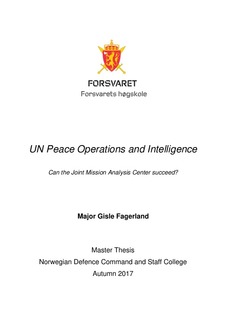| dc.description.abstract | Can the Joint Mission Analysis Center (JMAC), as the dedicated and fielded UN intelligence capability, mitigate challenges in providing the United Nations (UN) Mission Leadership Team (MLT) intelligence that ultimately will improve the decision making process and enhance the ability of the UN to fulfill the will of the international community? Throughout this paper, this is the driving question. To address the question, the paper explores the JMAC concept as described in UN policy and guidelines as well as experiences of UN peace operations1 in the 21st century and particularly the ongoing operations in Mali and South Sudan. The paper will identify challenges that UN peace operations in general, and Mali and South Sudan specifically, have experienced. If the JMAC proves capable of mitigating these challenges properly, the JMAC concept can succeed. UN peace operations have experienced a transitional development from peacekeeping operations under chapter VI of the UN Charter towards more peace enforcement and protection of civilians in line with chapter VII. Both operations require analyzed information2 and information sharing at various levels, with various means, different actors, mandates and perceptions. There is extensive literature elaborating on Intelligence and the UN. Recently, the UN has produced Guidelines and Policy describing the role of intelligence and the JMAC, which, in combination with document studies and interviews, will serve as a theoretical basis for this paper. There have, furthermore, been several studies of JMACs in UN peace operation missions identifying numerous challenges. This study, however, might enhance our understanding of Intelligence in UN peace operations and to what extent the JMAC, using the Intelligence Cycle as a framework, is able to address intelligence challenges in the UN. Throughout the paper, and the discussion, the challenges are elaborated and discussed as to whether they pose limitations or possibilities for the JMAC to succeed in UN peace operations. The findings from the research indicates that, though the JMAC concept has vastly enhanced UN capabilities in peace operations, there are some grave challenges that cannot be addressed by the JMAC alone. Intelligence in the UN is contested with a lack of coherent terminology complicating the understanding and discussion. Furthermore, intelligence in the UN and all the steps in the Intelligence Cycle, can be more effectively addressed if there is a responsible and accountable strategic entity that ensures information sharing at all levels from the field to New York. The paper concludes that the JMAC cannot mitigate key UN Intelligence challenges, realize its potential and succeed without an overarching intelligence body. | nb_NO |
